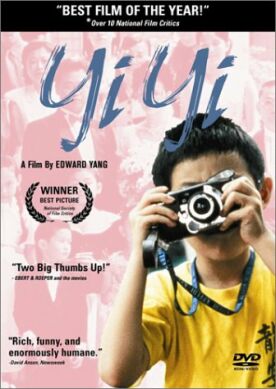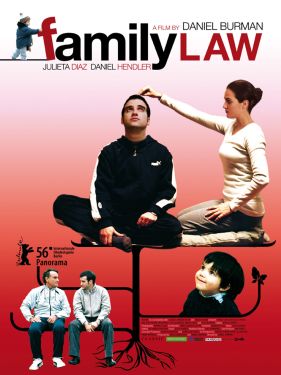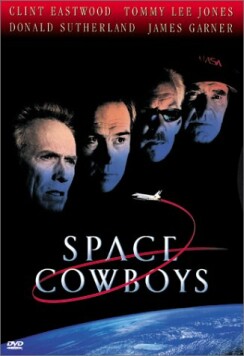Yi Yi
Nearly three hours long and slow to get started, Yi Yi, (“A one and a two. . .”), a Taiwanese domestic epic by the writer-director Edward Yang, is nevertheless worth waiting out. By the end, it does what only the best movies do, which is to make us care so much about its characters that their fate is both interesting and moving. The center of our attention is N.J. Jian (Wu Nienjen), a middle-aged businessman whose life is suddenly thrown into a state of uncertainty — marital, professional and personal — and who picks his way through the emotional minefield with stolid good humor and a moral compass that, in spite of some erratic behavior, does not let him down. But we also see something of the inward lives of his wife and children and of the moral and social orientations of present-day Taiwan.
As the film begins, we find ourselves at the wedding of N.J.’s wife’s brother, the ne’er-do-well A-Di (Chen Xisheng) who is promising N.J. to pay back the money he owes him. His bride is the very pregnant Xiao Yan (Xiao Shushen), and the wedding reception is invaded by another girlfriend, the jealous Yun Yun (Zeng Xinyi) who throws a fit and cries to the bridegroom’s mother: “It should have been me marrying your son today. . .Where is that pregnant bitch?” She is escorted off the premises before she can physically assault Xiao Yan. In comparison with such exciting relatives, N.J. seems rather a stick, but his six-year-old son, Yang Yang (Jonathan Chang) provides much amusement by carrying on a clandestine war with his teasing girl cousins.
Soon after the wedding, N.J.’s mother-in-law (Tang Ruyun), who lives with him and his family — his wife, Min Min (Elaine Jin) and teenage daughter Ting Ting (Kelly Lee) as well as Yang Yang — suffers a stroke and is confined to bed. Various family members are called on to talk to her in an attempt to bring her back to consciousness. Talking to the unresponsive old lady serves as a sort of confessional for all the members of the family, as each individually engages in the usual mix of self-discovery and self-dramatization that confession encourages. Min Min is badly upset by this, partly because it is her mother but also because in talking to her about her day, she realizes how empty her days are. This produces a spiritual crisis in her and she arranges to go on a retreat with some Buddhist monks. N.J. writes the check.
Ting Ting is upset because she feels guilty about her grandmother’s stroke. She had been told to take out the garbage and forgot the bag on the balcony while she was watching her more sophisticated friend, Lily (Adrian Lee), kissing her boyfriend in the street. Grandmother had suffered the stroke while taking the bag down after she left it there. “Did I forget to take out the garbage? I can’t remember,” she agonizes to her comatose granny. “If you forgive me, wake up,” she says, as she is being kept up at night by her guilt. Or by something. A Di comes to sit with his mother, bragging that “I’m rich now; people come to me for loans. It’s not like the old days when I was borrowing everywhere.” But he is still avoiding N.J. But Yang Yang resents having to sit with his grandmother and talk “What’s the point?” he asks his mother. “She can’t see what I tell her.”
N.J. is the one with the wit to say to his mother-in-law that the task of sitting and talking with her is “like prayer” because “I’m not sure if the other party can hear me, and I’m not sure I’m sincere enough….There’s very little I’m certain of these days,” he says. Then abruptly he asks: “Would you want to wake up if you were me?” Of course there is no answer. We learn that the company in which N.J. is a senior executive is in danger of going bust. His colleagues look to a Japanese partner, Mr. Ota (Issey Ogata) to bail them out, while at the same time dickering with the Taiwanese maker of a cheap imitation of Mr. Ota’s product (which seems to be some kind of video game), who cleverly goes under the name of Ato. Because he looks honest, N.J. is chosen to try to buy some time by going to dinner with Mr. Ota.
Obviously resenting his task (“Is anything real anymore?” he asks, suggesting a spiritual crisis of his own), N.J. is flattered when Mr. Ota takes a shine to him and tells him — in English, since neither speaks the other’s language: “You are like me. You cannot tell a lie.” And then he tells him the difficulties his company is in. They also talk about music, which both are passionate about, and subsequently at a karaoke bar, Mr. Ota shows off his musicianship by playing both “Sukiyaki” and Beethoven’s “Moonlight” sonata at the piano.
At about the same time, an old flame of N.J.’s, Sherry Breitner (Ke Suyun), who is now married to an American and living in Chicago, comes back into his life, reproaching him for having abandoned her 30 years ago. When N.J. has to fly to Tokyo to make a deal with Mr. Ota, Sherry arranges to fly in from Chicago to meet him there. For a while it looks as if they are going to rekindle their old romance, but they end up mainly reminiscing and talking about what went wrong. In a nicely managed bit of parallelism, reinforced with judicious cross-cutting, while N.J. and Sherry are recalling their youthful love in Tokyo, Ting Ting, left on her own back in Taipei, is beginning a tentative romance with Lili’s now-discarded boyfriend, who is called Fatty (Yupang Chang) because he is so thin.
The only slightly annoying thing about this movie is the excessively cute Yang Yang. I don’t mind his own adventures at school, where he is persecuted by a teacher and his teacher’s pet, whom the kids call “The Concubine,” but the self-consciousness with which he is also being used to point the moral for the grownups is at times over the top. He goes around taking pictures of the backs of people’s heads — because they cannot see them themselves — and points out to his father in the car that “I can’t see what you see, and you can’t see what I see.” Does it then follow that “we can only know half the truth, only see from one side”? Well, yes, but the observation is rather on the banal side and will not bear the weight that Yang wants to put on it, especially when put in the mouth of his adorable little namesake.
But domestic epic always does tend to the banal. The trick is to make it seem important anyway, and Yang does this on the whole. At one point Fatty and Ting Ting discuss the movie they have just seen and how, as Fatty says, we love the movies because they are so lifelike. Why bother going to the movies, then, says Ting Ting, when we have life itself? Because, says Fatty, they are like life only more so — real life magnified times three. There is a considerable irony here in view of what becomes of Fatty, but Yang is also pointing to his own use of this magnification effect in order to show us the moral significance in what might without it seem the insignificant lives of his characters.
And the process even illuminates, perhaps with a hint of autobiography little Yang Yang’s climactic speech, which he has written out, before his grandmother’s coffin: “I’m sorry Grandma. It wasn’t that I didn’t want to talk to you, but I thought you must already know anything I could tell you. . .That’s why you always said ‘Listen’. . .When I grow up, I want to tell people things they don’t know.” At any rate, Yang does tell us things we didn’t know, which is what movies at their best can do.
Discover more from James Bowman
Subscribe to get the latest posts to your email.








